Early antiretroviral therapy improves neurodevelopmental outcomes in infants
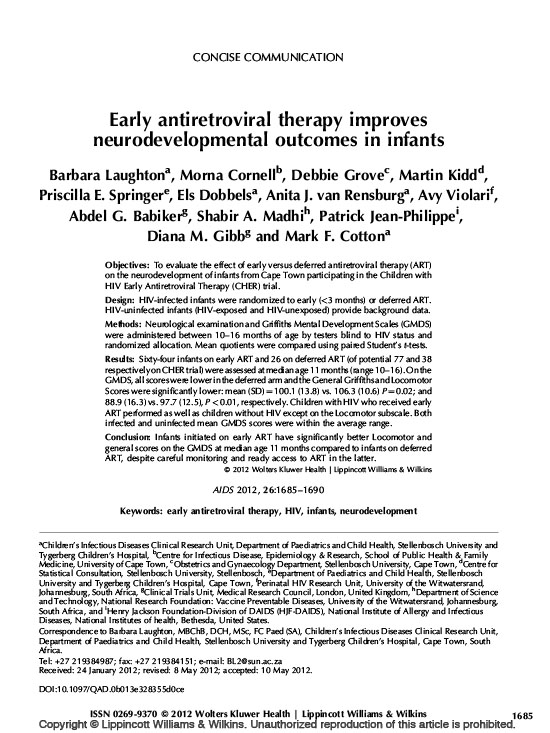
Objectives To evaluate the effect of early versus deferred antiretroviral therapy (ART) on neurodevelopment of infants from Cape Town participating in the CHER (Children with HIV Early Antiretroviral Therapy) trial. Design HIV-infected infants were randomised to early (<3 months) or deferred ART. HIV-uninfected infants (HIV-exposed and HIV-unexposed) provide background data. Methods Neurological examination and Griffiths Mental Development […]
Early Antiretroviral Therapy reduces the incidence of otorrhea in a randomized study of early and deferred antiretroviral therapy: Evidence from the Children with HIV Early Antiretroviral Therapy (CHER) Study
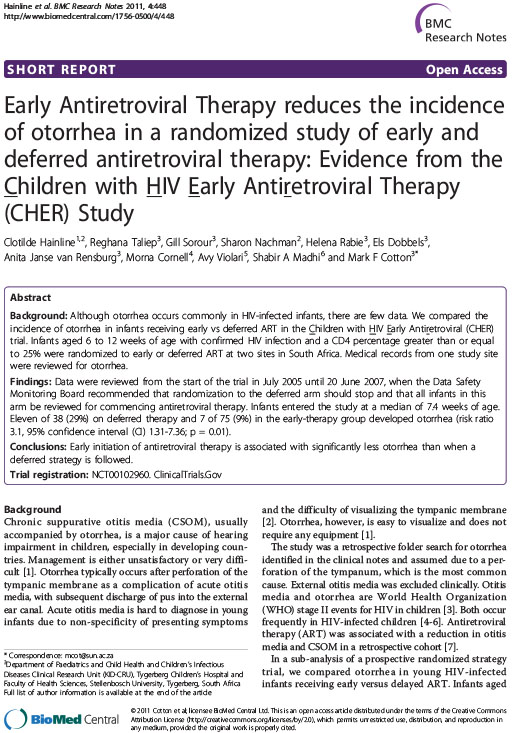
Background Although otorrhea occurs commonly in HIV-infected infants, there are few data. We compared the incidence of otorrhea in infants receiving early vs deferred ART in the C hildren with H IV E arly Antir etroviral (CHER) trial. Infants aged 6 to 12 weeks of age with confirmed HIV infection and a CD4 percentage greater than or equal to 25% were randomized […]
Reaching key adolescent populations
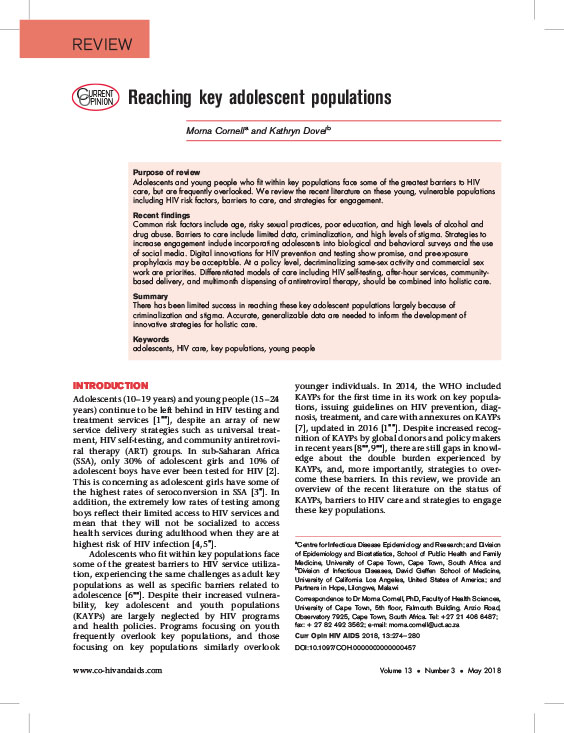
Purpose of review Adolescents and young people who fit within key populations face some of the greatest barriers to HIV care, but are frequently overlooked. We review the recent literature on these young, vulnerable populations including HIV risk factors, barriers to care and strategies for engagement. Recent findings Common risk factors include age, risky sexual […]
Research priorities to inform “Treat All” policy implementation for people living with HIV in sub‐Saharan Africa: a consensus statement from the International epidemiology Databases to Evaluate AIDS (Ie DEA)
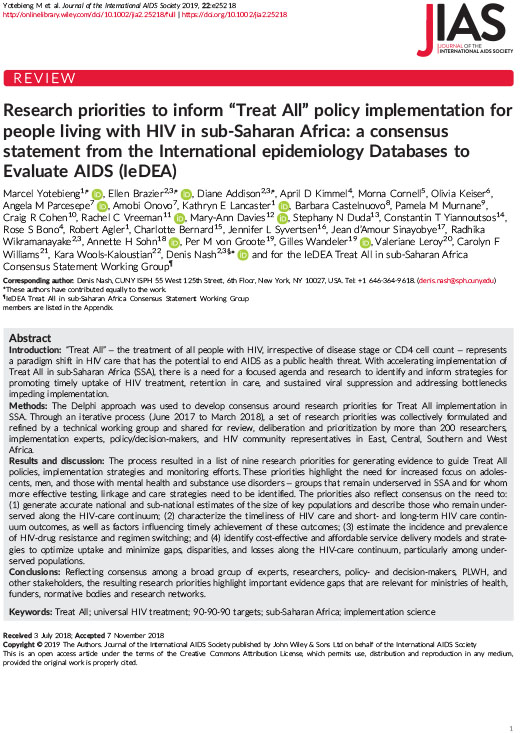
Introduction “Treat All” – the treatment of all people with HIV, irrespective of disease stage or CD4 cell count – represents a paradigm shift in HIV care that has the potential to end AIDS as a public health threat. With accelerating implementation of Treat All in sub-Saharan Africa (SSA), there is a need for a […]
Reaching underserved South Africans with integrated chronic disease screening and mobile HIV counselling and testing: A retrospective, longitudinal study conducted in Cape Town

Background Community-based, mobile HIV counselling and testing (HCT) and screening for non-communicable diseases (NCDs) may improve early diagnosis and referral for care in underserved populations. We evaluated HCT/NCD data and described population characteristics of those visiting a mobile clinic in high HIV disease burden settings in Cape Town, South Africa, between 2008 and 2016. Methods […]
Monitoring and Switching of First-line Antiretroviral Therapy in sub-Saharan Africa: Collaborative Analysis of Adult Treatment Cohorts
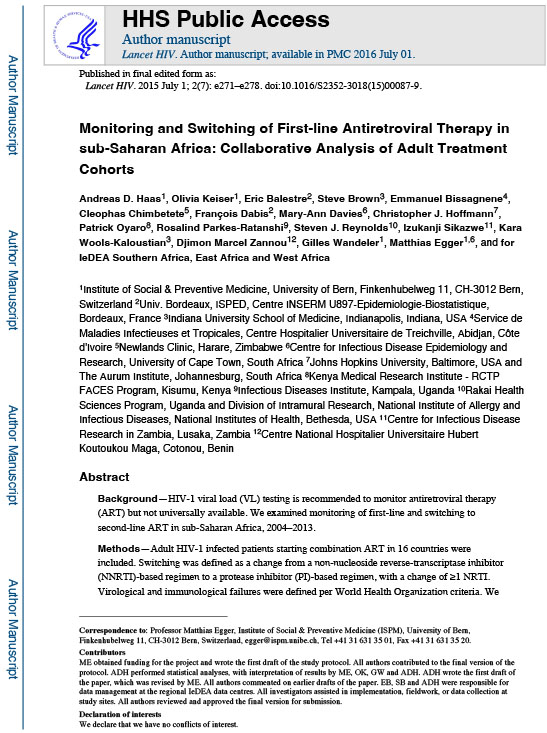
Background HIV-1 viral load (VL) testing is recommended to monitor antiretroviral therapy (ART) but not universally available. We examined monitoring of first-line and switching to second-line ART in sub-Saharan Africa, 2004–2013. Methods Adult HIV-1 infected patients starting combination ART in 16 countries were included. Switching was defined as a change from a non-nucleoside reverse-transcriptase inhibitor […]
Mortality risk in older people on antiretroviral therapy
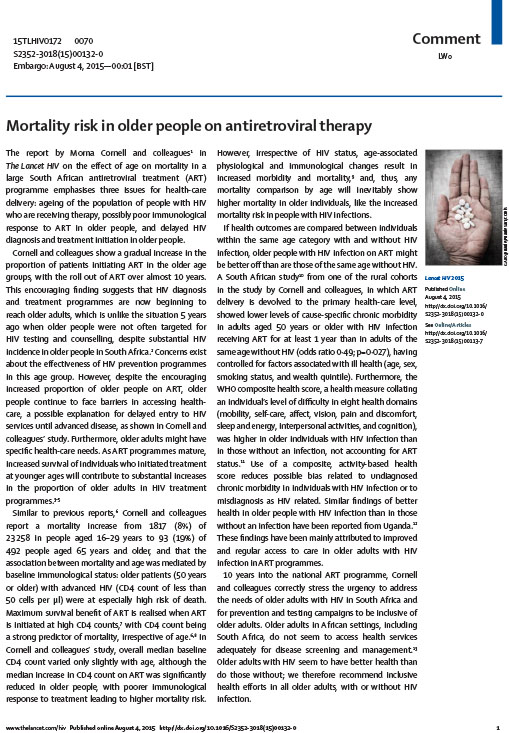
The report by Morna Cornell and colleagues in The Lancet HIV on the effect of age on mortality in a large South African antiretroviral treatment (ART) programme emphasises three issues for health-care delivery: ageing of the population of people with HIV who are receiving therapy, possibly poor immunological response to ART in older people, and delayed HIV diagnosis […]
Age in antiretroviral therapy programmes in South Africa: a retrospective, multicentre, observational cohort study
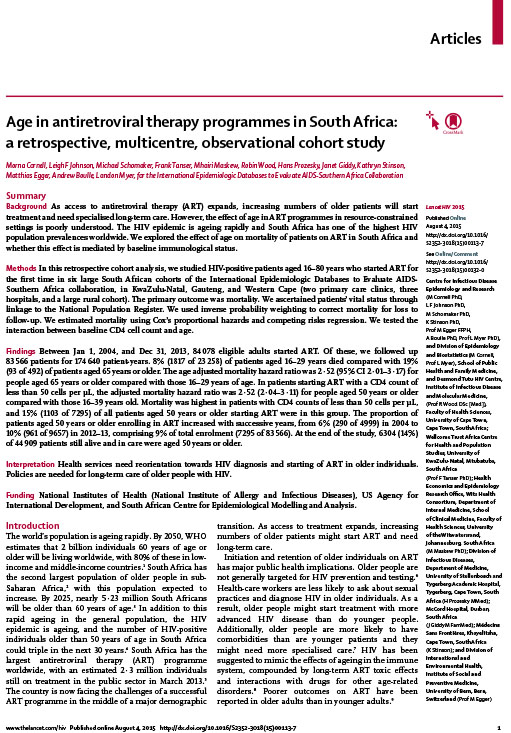
Background As access to antiretroviral therapy (ART) expands, increasing numbers of older patients will start treatment and need specialised long-term care. However, the effect of age in ART programmes in resource-constrained settings is poorly understood. The HIV epidemic is ageing rapidly and South Africa has one of the highest HIV population prevalences worldwide. We explored the effect […]
Expansion of the Adherence Club model for stable antiretroviral therapy patients in the Cape Metro, South Africa 2011–2015

Objective The ambitious ‘90-90-90’ treatment targets require innovative models of care to support quality antiretroviral therapy (ART) delivery. While evidence for differentiated models of ART delivery is growing, there are few data on the feasibility of scale-up. We describe the implementation of the Adherence Club (AC) model across the Cape Metro health district in Cape […]
ART adherence clubs : a long-term retention strategy for clinically stable patients receiving antiretroviral therapy : forum
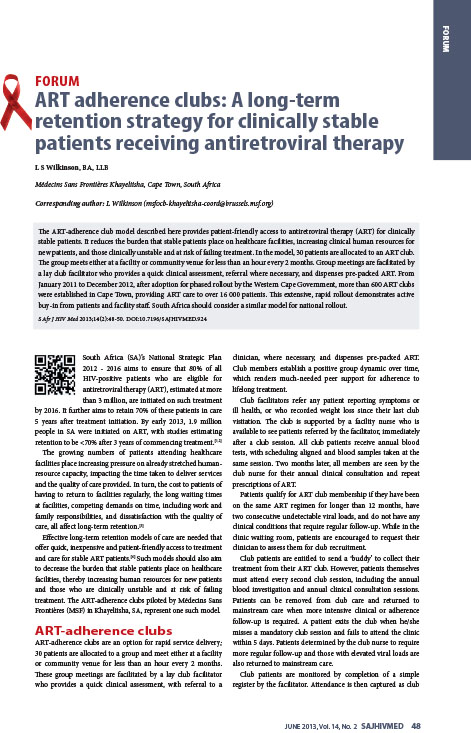
The ART-adherence club model described here provides patient-friendly access to antiretroviral therapy (ART) for clinically stable patients. It reduces the burden that stable patients place on healthcare facilities, increasing clinical human resources for new patients, and those clinically unstable and at risk of failing treatment. In the model, 30 patients are allocated to an ART […]


